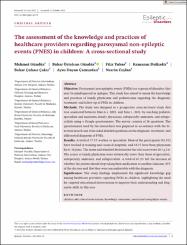| dc.contributor.author | Gündüz, Mehmet | |
| dc.contributor.author | Gunduz, Bahar Oztelcan | |
| dc.contributor.author | Tubas, Filiz | |
| dc.contributor.author | Dulkadir, Ramazan | |
| dc.contributor.author | Çakır, Bahar Cuhaci | |
| dc.contributor.author | Camurdan, Aysu Duyan | |
| dc.contributor.author | Ceylan, Nesrin | |
| dc.date.accessioned | 2023-12-29T07:19:19Z | |
| dc.date.available | 2023-12-29T07:19:19Z | |
| dc.date.issued | 2023 | en_US |
| dc.identifier.citation | Gündüz, M., Öztelcan Gündüz, B., Tubas, F., Dulkadir, R., Çuhacı Çakır, B., Duyan Çamurdan, A., & Ceylan, N. (2023). The assessment of the knowledge and practices of healthcare providers regarding paroxysmal non‐epileptic events (pnes) in children: a cross‐sectional study. Epileptic Disorders. | en_US |
| dc.identifier.issn | 1294-9361 | |
| dc.identifier.issn | 1950-6945 | |
| dc.identifier.uri | https://doi.org/10.1002/epd2.20174 | |
| dc.identifier.uri | https://hdl.handle.net/20.500.12513/5405 | |
| dc.description.abstract | Objective: Paroxysmal non-epileptic events (PNEs) are a group of disorders that may be misdiagnosed as epilepsy. This study has aimed to assess the knowledge and practices of family physicians and pediatricians regarding the diagnosis, treatment, and follow-up of PNEs in children.Methods: The study was designed as a prospective cross-sectional study that was conducted between March 1, 2022, and June 1, 2022, by reaching pediatric specialists and assistants, family physicians, subspecialty assistants, and subspecialists using a Google questionnaire. The survey consists of 26 questions. The questionnaire used by the researchers was prepared in accordance with the literature search and it included detailed questions on the diagnosis, treatment, and differential diagnosis of PNEs.Results: A total of 37.3% worked as specialists. Most of the participants (41.3%) have worked in training and research hospitals, and 44.3% have been physicians for 6-10 years. The mean and standard deviation for the total score were 10.1 +/- 2.6. The scores of family physicians were statistically lower than those of specialists, subspecialty assistants, and subspecialists. A total of 67.2% left the decision of whether the patient should stop taking their medication to another clinician. 45% of the doctors said that they were uncomfortable with the diagnosis.Significance: The study findings emphasized the significant knowledge gap among healthcare providers regarding PNEs in children, highlighting the need for targeted educational interventions to improve their understanding and diagnostic skills in this area. | en_US |
| dc.language.iso | eng | en_US |
| dc.publisher | John Lıbbey Eurotext Ltd | en_US |
| dc.relation.isversionof | 10.1002/epd2.20174 | en_US |
| dc.rights | info:eu-repo/semantics/openAccess | en_US |
| dc.subject | children | en_US |
| dc.subject | educational interventions | en_US |
| dc.subject | knowledge assessment | en_US |
| dc.subject | paroxysmal nonepileptic events | en_US |
| dc.title | The assessment of the knowledge and practices of healthcare providers regarding paroxysmal non-epileptic events (PNES) in children: A cross-sectional study | en_US |
| dc.type | article | en_US |
| dc.relation.journal | Epileptic Disorders | en_US |
| dc.contributor.department | Tıp Fakültesi | en_US |
| dc.contributor.authorID | Ramazan Dulkadir / 0000-0002-6640-9277 | en_US |
| dc.relation.publicationcategory | Makale - Uluslararası Hakemli Dergi - Kurum Öğretim Elemanı | en_US |


















